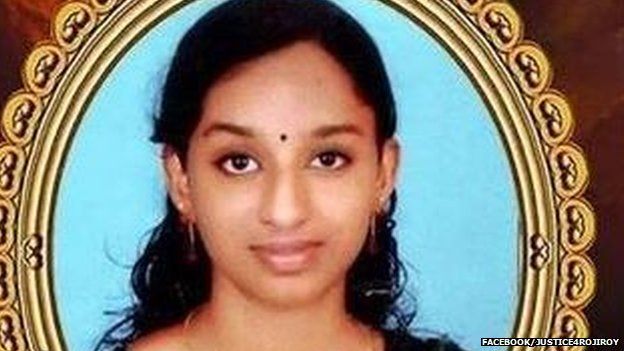#BBCtrending: The curious case of Roji Roy
- Published

When a nursing student in India took her own life, a massive social media campaign began in her name - but its real target is corporate India and the "ruling class".
It's easy to see why Roji Roy has come to symbolise, for many people online, the divide between ordinary people and an increasingly corporate and globalised India. She was young. She was from a poor family. She studied in one of India's increasing number of private hospitals, which describes itself as a "a landmark healthcare destination," and took her own life after a run-in with the authorities there.
Roji Roy died on 6 November after reportedly falling from the 10th floor of the Kerala Institute of Medical Sciences (KIMS) hospital building in Thiruvananthapuram, in Kerala. A complaint had been made about her behaviour towards two first year students, who had accused her of "ragging" - a term to describe the bullying of new students. The hospital had started an inquiry into the bullying, which she denied, shortly before she died.
Her death has prompted thousands of people to post photos, videos and status updates on Facebook in support of the nursing student. There was a common theme running through all these social media protests: a rage against the "ruling class" in Kerala. People think her background had a bearing on the initial media coverage and police investigation.
The Facebook page, 'Justice for Roji Roy', has over 40,000 'likes' and receives hundreds of photos every day from its community. The page was shared among Keralites on social media and organisers say the campaign has attracted support from Indians in the Middle East, the UK, South Africa, and the United States. "We started the page because we felt there was a media silence," says Jahangeer Razack Paleri, one of the main administrators of the page. "The media are only giving news related to the corporate companies who are giving advertising to them. They are avoiding the poor sector of our society. Also, there was no police investigation or inquiry by the authorities, and this upset Keralites. We are very active on social media in general."
The uproar online has led to the state government announcing a probe.
The hospital and the police deny any such agenda and say they simply acted in accordance with the rules.
"We are still conducting our investigation and have not reached any conclusion yet," Thiruvananthapuram police commissioner H. Venkatesh told BBC Trending.
"People have started twisting stories on social media about the hospital. Our mistake was we did what was legally required" said E M Najeeb, the hospital's executive director told the BBC. Indian law obliges an investigation into anyone accused of "ragging". The hospital is not being allowed to make its point, he added: "When we posted our statement on these Facebook pages, they are removed immediately" he said.
Jahangeer says that they have persisted with the Facebook campaign in the face of "severe threats" from anonymous callers. A posting on the Facebook page says the campaign is not against the hospital, but the "ruling class" in general.
Kerala has a tradition of left-wing politics and there has been widespread frustration with the way the news is reported - with "paid news" scandals rocking India and fear that the media will not report what large advertisers do not want them to.
Reporting by Ravin Sampat, India Rakusen & Samiha Nettikkara
You can follow BBC Trending on Twitter @BBCtrending
All our stories are at bbc.com/trending